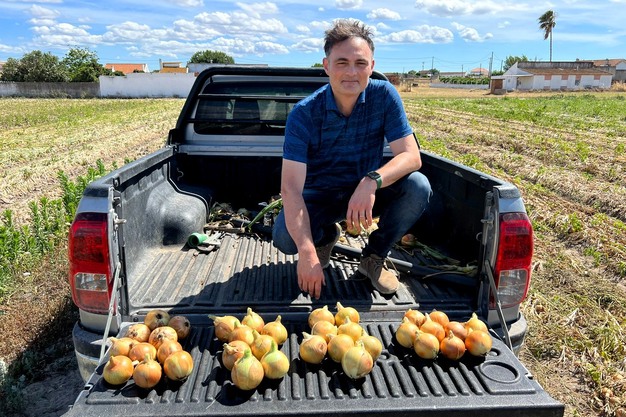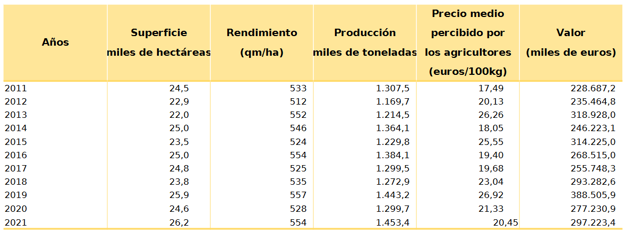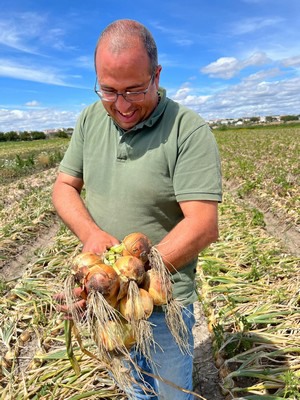Hybrid varieties brought the "most significant change for onion cultivation in Spain in the last 30 years," says David Casanoves, of Spanish company Agriseeds. They allowed a drastic transformation of the industry thanks to the rapid development of a complete range of improved varieties for all cycles: early, intermediate and late, adapted to different weather conditions across the country.
"At Agriseeds, we were pioneers in working with hybrid onions in the Spanish market. From the beginning, more than 25 years ago, we have been working with Japanese seeds, which have very refined genetics, and we have become specialists in varieties in the early and semi-early segment."

"The market is always looking to innovate, something that is increasingly appreciated, and it is more demanding in terms of the requirements that the products must meet. Competition is fierce and, the more there is, the better your product must be," he says. "Regarding onions in particular, what the market demands is high-yield varieties with a good shelf life and good skins."
"We offer early materials with a very good color, a very good shelf life, and, very importantly, with great firmness. One of the most pressing problems in the field, applicable to other products besides onions, is the shortage of labor and the rising costs, which are pushing growers towards greater mechanization in the harvest."
"In onions, mechanical harvesting can only be carried out if your product has the necessary resistance to prevent it from suffering damages that may lead to claims, and we have achieved this in this early segment with varieties such as the Arana and Terena; two onions for May productions that are highly suited for direct sowing, and which deliver good sizes, firmness, shelf life and yields. At this time, they are being harvested in areas like Lebrija, Sanlúcar de Barrameda, Alcalá del Río or Palma del Río, where they are achieving very good results."
"Last season's prices encouraged many growers to plant onions this year"
In recent seasons, onions have experienced a "resurgence", with prices that have notably increased, even momentarily exceeding 77 cents per kilo in the second half of April last year, according to reports from the MAPA. However, after a certainly positive period, prices right now are falling to values reminiscent of the previous decade.

Source: MAPA.
"Onion prices started to rise two years ago and have remained very attractive since then throughout the campaign, encouraging many people to plant them this year," says David. "In a way, it could be said that this has truncated that 'resurgence' we had seen in the onion sector, with the supply currently not aligned with the demand."
"Right now, prices at origin amount to between 10 and 15 cents per kilo, which doesn't even cover the production costs. In supermarkets, prices are still high, as they are taking advantage of the high prices of earlier, so we don't know if this drop in the prices at origin will be passed on to the retail and the final consumer, who continues to pay high prices for onions."
 "At the same time, supermarkets appear to be extending the period in which they only work with imports from Peru, Chile, New Zealand and even China. This is pushing prices up and harming the domestic product. Nevertheless, while we keep talking about supermarkets, the processing industry is also an important destination for the crop."
"At the same time, supermarkets appear to be extending the period in which they only work with imports from Peru, Chile, New Zealand and even China. This is pushing prices up and harming the domestic product. Nevertheless, while we keep talking about supermarkets, the processing industry is also an important destination for the crop."
"30% of the onions produced in Spain, or even a higher percentage, are intended for industrial processing. The prices paid these years, which are too high for the industry, drove many processors to buy their raw material cheaper in other countries, because in the processing sector, prices are a decisive factor. Now, in the context of a very mature and stable consumer market, if that 30% of the up to 1.4 million tons of onions produced in Spain does not sell out, we should start giving a boost to exports, since the industry will continue to buy cheap onions, regardless of whether they are Spanish or not."
"Compared to the rest of Europe, Spain has a very interesting window from May to July; a period when the producing countries, mainly the Netherlands, only market onions that have been stored in chambers for about 7 months."
"We can deliver truly fresh onions of superior quality to Europe and we must try and make the most of it, especially if you have varieties with the right firmness, color and shelf life, also in the early and extra-early segments, like we do at Agriseeds."
 For more information:
For more information:
Agriseeds Ibérica S.L.
Av. Cortes Valencianas, 28-1.º B
Valencia - Spain
Tel.: (+34) 961 204 342
info@agriseeds.es
https://agriseeds.es
